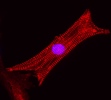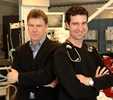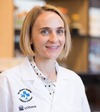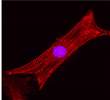
|
Epigenetics may explain statins’ anti-inflammatory power
May 17, 2024
-
“If we can understand more about how statins reduce inflammation at the molecular level, we may be able to design new drugs that can complement statins and enhance heart attack prevention."
|

|
Study reveals molecular reason why arteries harden with age
May 14, 2024
-
“These cells could help us uncover potential drugs to prevent or treat cardiovascular diseases by targeting these molecular changes."
|

|
Brain Heart Interconnectome to lead a paradigm shift
April 28, 2023
-
From cognitive impairment to heart failure, brain and heart conditions pose one of the world’s biggest health-care challenges, exceeding all others in disease burden and mortality.
|
|
Show more news stories
|

|
How should patients with acute heart failure be monitored? This tool can help.
March 7, 2023
-
A clinical decision tool used in the emergency department can improve outcomes for patients with acute heart failure, according to trial involving more than 5,000 patients, published in the New England Journal of Medicine.
|

|
Researchers at The Ottawa Hospital awarded 18 CIHR grants worth more than $11 million
February 5, 2022
-
These projects will advance science and improve health in areas such as tuberculosis, blood disease, prostate cancer, heart disease, muscle repair, sleep apnea, brain cancer, medical imaging, virtual care, prehab, intellectual disability, sarcoma, CA
|

|
The Ottawa Hospital awarded six CIHR grants worth $2.6 million
September 7, 2020
-
Could a common diabetes drug help prevent ovarian cancer? Can a tailored screening program help prevent eye disease in immigrants? Is sepsis different in females versus males, and if so, can this help us develop better treatments? These are just a fe
|

|
The Ottawa Hospital awarded nine grants worth $5.6 million from Canadian Institutes of Health Research
February 3, 2020
-
How can we treat depression when nothing else is working? How can heart growth be both good and bad? How can we increase patient participation in clinical trials? These are just a few of the big questions that researchers at The Ottawa Hospital will
|

|
Intravenous drugs can often rapidly restore normal heart rhythm without sedation, shocks
January 30, 2020
-
A study published in The Lancet found that two ways of quickly restoring normal heart rhythm in patients with acute atrial fibrillation in the emergency department are equally safe and effective.
|

|
Feature grant: Researchers investigate how cholesterol regulates inflammation in white blood cells
August 7, 2019
-
Drs. Xiaohui Zha and Alexander Sorisky were awarded $48,000 to test whether cholesterol regulates inflammation in human white blood cells by altering gene expression.
|

|
Research shows how good heart growth turns bad
January 30, 2019
-
More than 17 percent of Canadians have been diagnosed with high blood pressure, a condition that makes it more difficult for the heart to pump blood around the body. At first, heart muscle grows to meet the challenge, but eventually this growth becom
|

|
How long do people need to be monitored after fainting?
January 21, 2019
-
For the first time, physicians in the Emergency Department (ED) have evidence-based recommendations on how best to catch the life-threatening conditions that make some people faint. New research published in Circulation suggests that low-risk patient
|

|
Severe sleep apnea increases risk of irregular heartbeat
December 11, 2018
-
Severe sleep apnea increases the risk of hospitalization for new atrial fibrillation, or irregular heartbeat, according to a study led by Dr. Tetyana Kendzerska. The study followed more than 8,000 people who were originally free of any irregular hear
|

|
Researchers awarded $1.7 M to tackle stroke and heart attack from multiple angles
October 2, 2018
-
Five groups from The Ottawa Hospital, affiliated with the University of Ottawa, were successful in the Heart and Stroke Foundation's recent grant competition. Drs. Dar Dowlatshahi, Tim Ramsay and Elizabeth Rochon were awarded $290,000* to test whethe
|

|
Can a calculator predict your risk of heart attack and stroke?
July 23, 2018
-
Canadian researchers have built and validated an online calculator that empowers individuals to predict their risk of cardiovascular disease. Their process was published today in the journal CMAJ, and the calculator is available at projectbiglife.com
|

|
Patent brings possible new heart failure treatment closer to reality
May 30, 2018
-
Drs. Lynn Megeney, Duncan Stewart, Colin Suen, and Mohammad Abdul-Ghani have been granted a U.S. patent for an experimental approach to treat heart failure using a protein called cardiotrophin 1 (CT1). Heart failure is a leading cause of death and di
|

|
Could stem cells repair the heart, fight infections, mend premature lungs, and heal the brain after stroke?
April 11, 2018
-
Ottawa researchers closer to finding out, thanks to $999,900 from the Stem Cell Network
Researchers from The Ottawa Hospital, CHEO and the University of Ottawa are bringing discoveries made in the lab closer to human trials and therapies, thanks
|

|
$5.5 million to help save lives when the heart stops and standardize care for rapid heartbeat
March 9, 2018
-
Two national projects led by Ottawa emergency medicine researchers received a total of $5.5 million from the Cardiac Arrhythmia Network of Canada (CANet) and matching funders. Dr. Christian Vaillancourt’s team* aims to help 9-1-1 communication offi
|

|
Pre-treated cells boost blood vessel repair
November 29, 2017
-
Endothelial colony-forming cells (ECFCs) are stem-like cells found in umbilical cord blood that help repair damaged blood vessels. They may hold promise for the treatment of stroke, heart attack and blocked leg arteries. However, their rate of bloo
|

|
How to trick your heart into thinking you exercise: cardiotrophin improves heart health and repairs damage in lab models
August 4, 2017
-
Researchers have discovered that a protein called cardiotrophin 1 (CT1) can trick the heart into growing in a healthy way and pumping more blood, just as it does in response to exercise and pregnancy. They show that this good kind of heart growth i
|

|
Monitoring catches fainting patient’s irregular heartbeat
January 3, 2017
-
“This monitor – this research – saved my life. I’m convinced of it,” said patient Jacinthe Bisson, who took part in a research study to monitor patients with fainting spells.
|
.jpg)
|
$3M research initiative aims to improve survival after cardiac arrest and trauma
January 20, 2016
-
The Heart and Stroke Foundation and the Canadian Institutes of Health Research are providing $3 million to create the new Canadian Resuscitation Outcomes Consortium (CanROC), co-led by Dr. Ian Stiell. The initiative will focus on improving survival
|
